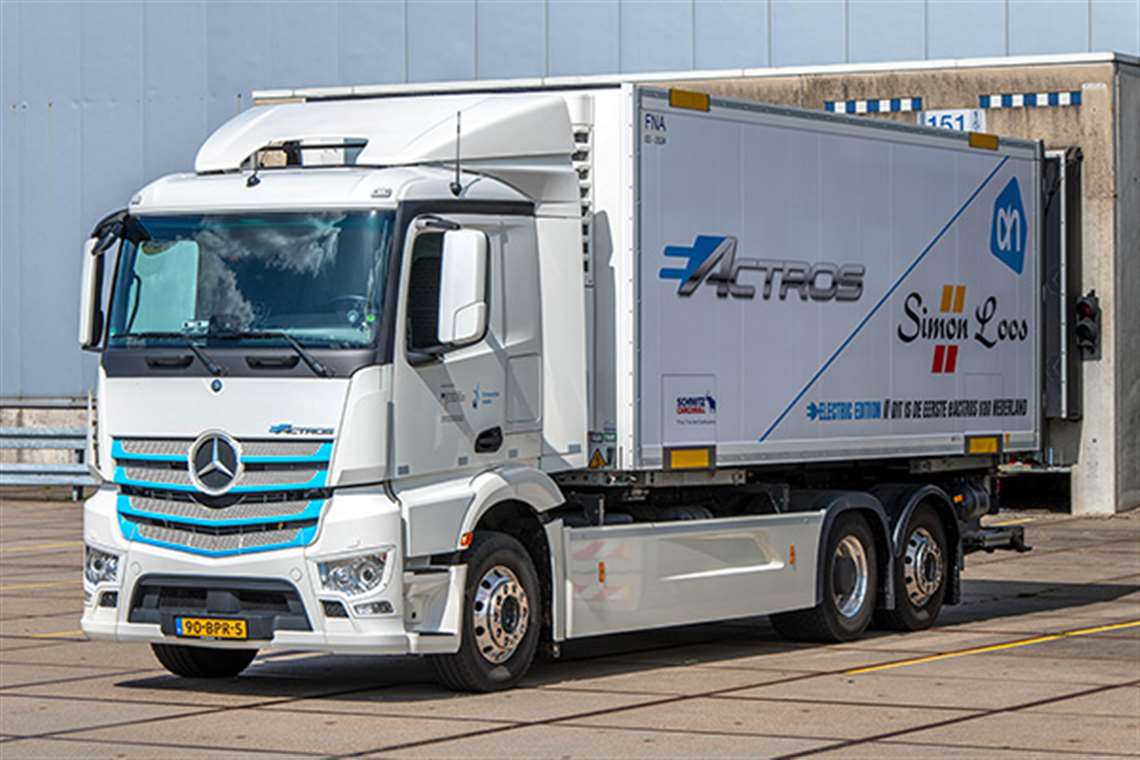Second Phase Of eActros Truck Testing Begins
06 August 2020

Mercedes-Benz has started the second test phase for its eActros innovation fleet.
After about a year of intensive practical use by 10 customers in Germany and Switzerland, eight of the battery-powered trucks are now successively going to new customers in Germany, Belgium and the Netherlands. The vehicles will be operated in everyday transport operations for about a year, while two vehicles will continue the operational testing with customers in the first test phase.
Simon Loos, a logistics services company based in the Netherlands, will receive the first eActros of the second phase.
“We started the practical test of our eActros in September 2018 and have already covered hundreds of thousands of kilometers electrically,” said Andreas von Wallfeld, head of Marketing, Sales and Services Mercedes-Benz Trucks. “The findings from the first phase have made a valuable contribution to the planned start of series production next year.
“We are now testing our electric truck for its suitability in everyday use with new customers from various sectors in Germany and abroad. We are delighted that we can announce the start of the second wave of customers with Simon Loos.”
Looking toward a sustainable future
Simon Loos is using an eActros equipped with a refrigerated box for the Albert Heijn supermarket chain. The daily tour of the eActros starts at Albert Heijn’s regional distribution center in Delfgauw in the province of South Holland. From there, the e-truck supplies supermarket stores in various cities in the region, including Rotterdam, The Hague and Delft, with dry goods and fresh, temperature-controlled food.
The eActros will run seven days a week, covering around 200 km every day in locally CO2-neutral operation. The batteries will be charged overnight and in between routes at the distribution center in Delfgauw, where Albert Heijn is currently constructing an innovative square with multiple fast chargers. In preparation for the test, experts from Mercedes-Benz Trucks gave the Simon Loos drivers special training in the use of high-voltage systems.
“As the leading logistics service provider in the Netherlands, we naturally place great emphasis on sustainability in our strategy,” said Wim Roks, fleet manager, Simon Loos. “We have been gaining experience with alternative drive systems in our fleet since 2014. With the practical test of the eActros, we are now taking another big step towards sustainable transport in the retail sector – together with Albert Heijn and Mercedes-Benz Trucks. We are looking forward to the experience we can gain with the vehicle over the coming months.”
Findings from the first phase
One of the many findings gained during the practical tests in the first test phase is that the range of the eActros of approximately 200 km has proven to be realistic – regardless of load, route or topography. The eActros has shown itself to be comparable to a conventional diesel truck in terms of availability and performance in urban traffic, on highways or on overland routes, Mercedes-Benz said. The cooling system for the cargo and the air-conditioning system – both electrically operated – functioned without any limitations in both extreme heat and winter conditions. Drivers are pleased with the continuous availability of torque across the entire speed range, the company said, and they also mentioned the truck’s quietness in operation and the pleasant, smooth driving experience.
The eActros alternative
The eActros is based on the chassis of the Mercedes-Benz Actros, with changes in the vehicle’s architecture geared to electric drive with a high proportion of specific parts. Two electric motors close to the rear axle wheel hubs provide drive with an output of 126 kW each and a maximum torque of 485 Nm each. This results in 11,000 Nm each after the transmission ratio, providing a performance equivalent to that of a conventional truck. Lithium-ion batteries with 240 kWh supply the energy for the eActros. Depending on the available charging power, the batteries can be fully charged within two hours (at 150 kW).
The development and testing of heavy-duty electric trucks in distribution transport is receiving support from Germany’s Federal Ministry for the Environment (BMU) and Federal Ministry for Economic Affairs and Energy (BMWi), as part of the Concept ELV² project.
STAY CONNECTED




Receive the information you need when you need it through our world-leading magazines, newsletters and daily briefings.
POWER SOURCING GUIDE
The trusted reference and buyer’s guide for 83 years
The original “desktop search engine,” guiding nearly 10,000 users in more than 90 countries it is the primary reference for specifications and details on all the components that go into engine systems.
Visit Now
CONNECT WITH THE TEAM









